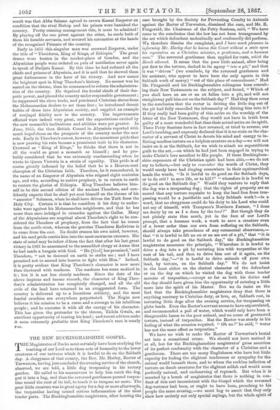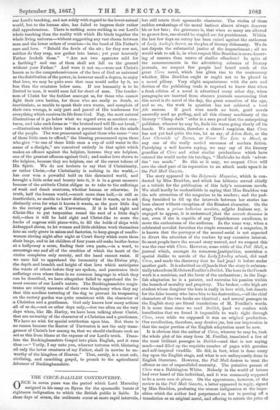THE NEW BUCKINGHAMSHIRE GOSPEL.
rrtHE Magistrates of Bucks must certainly have been studying the teaching of our Lord as to those acts of humanity to the lower creatures of our universe which it is lawful to do on the Sabbath day. A clergyman of that county, the Rev. Mr. Harley, Rector of Turwe,ston, having just concluded the evening service of the church, observed, we are told, a little dog trespassing in his rectory .garden. He called to his manservant to help him catch the dog, put it into a bag, and then the reverend gentleman poured turpen- tine round the root of its tail, to teach it to trespass no more. The ,poor little creature was in great agony for a day or more afterwards, the turpentine having caused serious inflammation of the most tender parts. The Buckinghamshire magistrates, after hearing the
case brought by the Society for Preventing Cruelty to Animals against the Rector of Turweston, dismissed the case, and Mr. R. Fitzgerald, the Chairman of the Petty Sessions, said, "We have come to the conclusion that the law has not been transgressed by the act which defendant undoubtedly and confessedly did perform. We therefore dismiss the complaint, and I have much pleasure in informing Mr. Harley that he leaves this Court without a stain upon his reputation as a Christian minister, a gentleman, and a humane man." The reverend gentleman then applied for costs, which the Bench allowed. It seems that the poor little animal, after being put first to the torture, dashed in its agony "into a pit," and that it was " driven " (we conclude, by the reverend gentleman and his assistant, who appear to have been the only agents in this Sabbath work of mercy) "out of this place of concealment." Had Mr. Fitzgerald and his Buckinghamshire colleagues been consult- ing their New Testaments on the subject, and found, "Which of you shall have an ass or an ox fallen into a pit, and will not straightway pull him out on the Sabbath day ?" Had they then come to the conclusion that the rector in driving the little dog out of the pit had fully cancelled the inhumanity of driving him into it? If they really had been guilty of this satire on the worship of the letter of the New Testament, they would not have in truth been guilty of a more wonderful feat than their actual satire on its spirit. These Petty Sessions have in fact reversed, or tried to reverse, our Lord's teaching, and expressly declared that it is no stain on the cha- racter of a servant of Christ to devote his mind and energy to in- flicting needless torture on a helpless creature on a day—we will not insist on it as the Sabbath, for we wish to attach no superstitions guilt to the act, —on which he had just been engaged in trying to make Christ's love manifest to His people. If these Buckingham- shire exponents of the Christian spirit had been able,—we do not say to believe,—but only to remember the words of Christ, they would surely have had ringing somewhere in their squirearchical heads the words, "Is it lawful to do good on the Sabbath days, or to do evil ? to save life, or to kill?" "wherefore it is lawful to do good on the Sabbath day." Would they venture to reply that the dog was a trespassing dog ; that the rights of property are so sacred that any torture requisite to keep the land free from tres- passing would be a justifiable and a holy Sabbath work?—in a word, that no clergyman could do his duty to his Lord who could not say of himself, with Tennyson's Northern Farmer, "I done ma dooty by un as I a done by the lond ?" But though they do not plainly state thus much, yet in the face of our Lord's precept, that a humane work, a work to save a creature even of a lower order than our own from suffering on the Sabbath, should always take precedence of any ceremonial observance,— that "it is lawful to lift an ox or an awl out of a pit," that "it is lawful to do good on the Sabbath day," the Buckinghamshire magistrates announce the principle, "Wherefore it is lawful to drive a dog into a pit by torturing him with turpentine at the root of his tail, and then to drive him out of it again, on the Sabbath day,"—" it is lawful to drive animals off your own land, by torture, on the Sabbath day." We do not insist in the least either on the clerical character -of the defendant or on the day on which he visited the dog with these tender mercies of turpentine,—except so far as both his duties and the day should have given him the opportunity of entering a little more into the spirit of his Master. But we do insist on the fact that the Buckinghamshire magistrates deny that there is anything contrary to Christian duty, or love, or, Sabbath rest, in torturing little dogs after the evening service, for trespassing on glebe lands. Even the Rector's servant seems to have expostulated, and recommended a pail of water, which would only have been a disagreeable lesson to the poor animal, and no cause of protracted torture, instead of turpentine. But the Rector was steady in his feeling of what the occasion required. "Oh no !" he said, " water has not the same effect as turpentine."
We have no wish to make the Rector of Turweston's brutal act into a sensational crime. We should not have noticed it at all, but for the Buckinghamshire magistrates' gross assertion of its perfect conformity with the character of a Christian and a gentleman. There are too many Englishmen who have but little capacity for feeling the slightest tenderness or sympathy for the animal world beneath them, and to whom the reckless infliction of torture on dumb creatures for the slightest selfish end would seem perfectly natural, and undeserving of reproach. But when it is asserted by a bench of magistrates that there is nothing in con- duct of this sort inconsistent with the Gospel which the reverend dog-torturer had been, or ought to have been, preaching to his people the same evening,—we must beg to assert that they only show how entirely not only special sayings, but the whole spirit of our Lord's teaching, and not solely with regard to the lower animal world, but to the human also, has failed to impress their rather dull apprehensions. There is nothing more striking in our Lord's -Whole teaching than the reality with which He binds together the whole living universe—without suggesting any vast chasm between man and the lower orders of creation—in the bond of His Father's care and love. "Behold the fowls of the air ; for they sow not, neither do they reap, nor gather into barns ; yet your heavenly Father feedeth them." "Are not two sparrows sold for a farthing? and one of them shall not fall on the ground without your Father." And were it not so,—were not Christ's lesson as to the comprehensiveness of the love of God as universal as the distribution of the power, in however small a degree, to enjoy that love, we may be quite sure that man would suffer by it, no less than the creatures below man. If our humanity is to be limited to man, it would soon fall far short of man. The tender- ness of Christ for the feeblest amongst us, for those who cannot fight their own battles, for those who are really as dumb, as inarticulate, as unable to speak their own wants, and complain of their own wrongs, is only part and parcel of His tenderness for -everything which receives its life from God. Nay, the most natural illustrations of it go below what we regard even as sentient crea- tures, and take such forms as "the bruised reed will He not break," -r--illustrations which have taken a permanent hold on the minds -of the people. The woe pronounced against those who cause "one of these little ones to offend," the blessing pronounced upon those who give "to one of these little ones a cup of cold water in the name of a disciple," are conceived entirely in that spirit which makes an offence against the helpless, because they are helpless, -one of the greatest offences against God ; and makes love shown to Nt he helpless, because they are helpless, one of the surest tokens of His Spirit. We do not hesitate to say that if Christianity, -or rather Christ,—for Christianity is nothing in the world,— lies ever won a powerful hold on this distracted world, and brought a little order and beauty into it, it is in a great measure because of the attitude Christ obliges us to take to the sufferings of weak and dumb creatures, whether human or otherwise. In truth, half the human world,—much more than half,—is still as inarticulate, as unable to know distinctly what it wants, or to ask distinctly even for what it knows it wants, as the poor little dog in the rectory garden at Turweston. If it is held right and -Christ-like to put turpentine round the root of a little dog's tail,—then it will be held right and Christ-like to score the backs of negroes with piano-wire, to fill the holds of ships with -kidnapped slaves, to let women and little children work themselves into an early grave in mines and factories, to keep gangs of needle- women slaving night after night at Court finery which costs them .their lungs, and to let children of four years old make lucffer-boxes at a halfpenny a score, finding their own paste,—in a word, to 'encourage one and all of the cruelties of which the heart of the victim complains only mutely, and the hand cannot resist. If we once fail to apprehend the immensity of the Divine pity, the depth and breadth and height of that love which anticipates the wants of others before they are spoken, and penetrates their .sufferings even where there is no connnon language in which they can be described, we have altogether failed to apprehend the in- most essence of our Lord's nature. The Buckinghamshire magis- trates are utterly unaware of their own blasphemy when they say that this needless torturing of the dog to prevent its trespassing on the rectory garden was quite consistent with the character of .a Christian aud a gentleman. God only knows how- many actions all of us do,—not on other days only,—but too often on the very
• days when, like Mr. Harley, we have been talking about Christ, that are unworthy of the character of a Christian and a gentleman. We have no wish for special retribution upon him. But there is .-no reason because the Rector of Turweston is not the only trans- gressor of Christ's law among us, that we should vindicate such an . act as this from blame at the expense of our Lord's truth. Trans- late the Buckinghamshire Gospel into plain English, and it runs thus :—‘, Verily, I say unto you, whoever tortures with blistering -oil only the lower creatures of my Father, shall in nowise be un- worthy of the kingdom of Heaven." That, surely, is a most safe, civilizing, and ennobling gospel, to preach to the agricultural • _labourer of Buckinghamshire.































 Previous page
Previous page